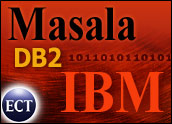
In an effort to change the fact that it is often easier to use an Internet search from Google to track down information than it is to find the same kind of content or data lying somewhere on a corporate network, IBM has unveiled a technology called DB2 Information Integrator.
Big Blue said its new software — code-named Masala — delivers faster, better search results from the variety of both structured and unstructured data stores found on corporate networks, such as spreadsheets, e-mail and phone messages. The software, which provides a single view of corporate information assets, will be capable of carrying query results from so-called “federated” sources as much as 10 times more quickly than before and without the hand-coding that has traditionally been required.
“The whole idea of getting the right information at the right time has been a struggle,” Yankee Group senior analyst Dana Gardner told TechNewsWorld. “It’s really truly a mess [for enterprises] on a micro level, because it’s your own PC, and at a macro level with the corporate network or the Internet.”
Too Much Information
Gardner explained that because the vast variety of databases that might hold the answers to a corporate query include both structured and unstructured data — such as PowerPoint presentations, e-mails and voice messages — companies cannot function efficiently.
“It is a huge problem and it’s a very complex problem,” he said. “A lot of companies are really spinning their wheels recreating information that has already been created or taking way too long to locate content and data that can help them in their business processes.”
IBM cited estimates that as much as 40 percent of annual IT budgets are destined for integration efforts and said that its beta Masala software was key to its larger services-oriented architecture (SOA) strategy to use standard business processes to integrate applications internally as well as with customers and suppliers.
Aiming for an estimated US$10 billion business integration market by 2006, IBM said its DB2 Information Integrator software would help companies gain access and insight into the many data repositories.
Way to Web Services
IBM said its software would help speed up information searches with traditional IBM features, such as self-management technologies and open standards. The company touted Masala tools and features, such as a database notification for data-source changes or outages; faster access from federated data sources; new replication capabilities to move twice as much data more quickly; and a new enterprise search that can pull information from documents, Web sites, databases and other sources.
IBM also said Marsala relies on existing infrastructure to link data and business processes through messaging software, which is key to the SOA effort.
Gardner said the integrated, federated approach made sense, and while IBM will not be competing with search engine portals — such as Google and Yahoo — it is leading the way into the enterprise where there is a need for access and privilege.
“This does address that,” Gardner said.
Competition, Content Ducks
Gardner said it will be interesting to see the corporate content management and search competition play out because Microsoft has a significant strategy and Google is increasingly looking toward the enterprise.
Gardner, who said the Masala strategy also fits into IBM’s idea of “middleware everywhere,” added that the software will be presented as a way for companies to prepare themselves and their data capabilities for wider Web services use.
“For the total cost of ownership benefit in infrastructure spending, you need to have your content ducks lined up,” he said. “That’s what this is.”




















































